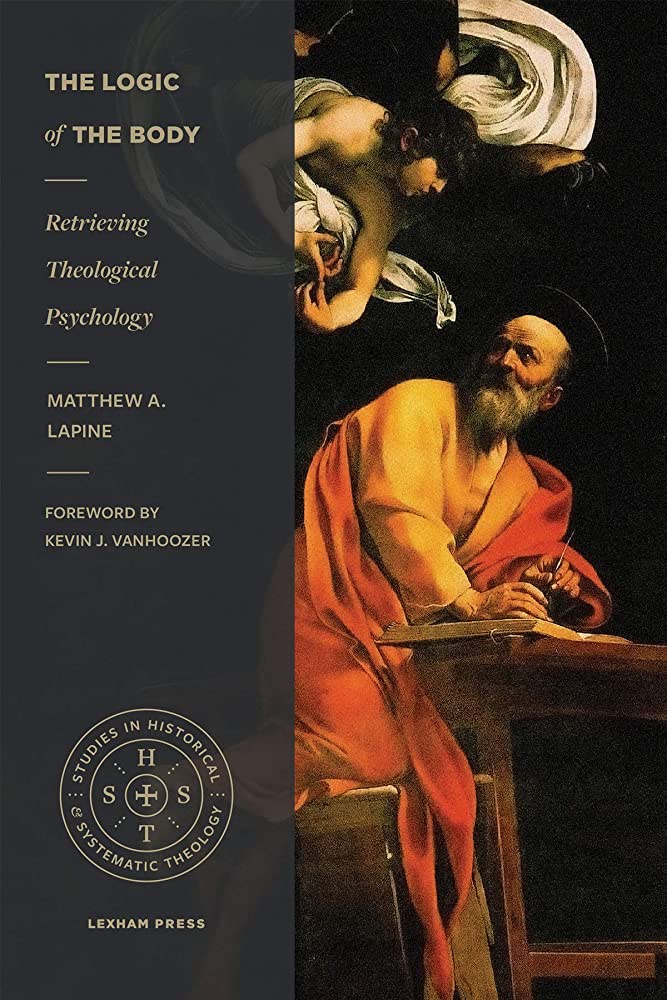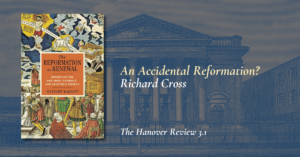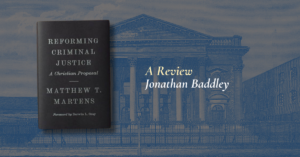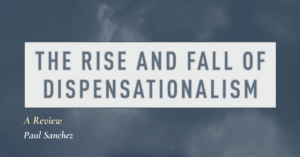LaPine, Matthew A. The Logic of the Body: Retrieving Theological Psychology. Bellingham, WA: Lexham Press, 2020. 439 pages. Paperback. 978-1683594253. $29.99.
Theological retrieval looks back in order to move forward. When adequately undertaken, the task of ressourcement allows the saints of the past to help the church of the present to continue to confess and live faithfully in a world that keeps changing. In the past half-century, very few areas of study have developed and changed as much as those of psychology and neuroscience. Perceiving the need to interpret the current findings of these fields while grounded on the faith of the Christian tradition, Matthew LaPine presents in The Logic of the Body a significant work of Reformed theological anthropology (xx).
The Logic of the Body is the product of LaPine’s Ph.D. research under Kevin Vanhoozer at Trinity Evangelical Divinity School (Deerfield, IL). His academic interests in theology, human emotion, the functions of the mind, and neuroscience were motivated by personal reasons and the desire to help those closest to him (as explained in this interview with the London Lyceum). Although the book does not read as a personal, ministerial endeavor, LaPine’s academic rigor and curiosity across various disciplines reveal a writer eager to find and organize answers for more than just scholarly contribution. In 2021, the book was listed as a finalist for Christianity Today’s book of the year in Theology and Ethics.
Adopting a holistic, Thomistic-like tiered psychology, LaPine’s research revolves around the question of how the body qualifies human agency. Displaying an attitude admittedly inspired by Herman Bavinck (206, 211), LaPine furthers the conversation between theology and contemporary psychology in light of the Christian tradition by suggesting a path that differs both from the cognitive, voluntaristic emphasis, usually seen in Reformed theological discourse about emotions, and the modern psychology account that roughly understands emotions as feelings of bodily changes (2). Positively, LaPine proposes that “Reformed psychology can gain empirical consistency and pastoral nuance by endorsing a genuinely holistic and tiered model of emotion, which is sensitive to how the body qualifies emotion” (6). It is possible to affirm that the body qualifies all functions of human psychology and admit that emotions are not merely instinctual, but rational.
Chapter 1 describes in detail the problem of emotional voluntarism identified in the introduction. Aiming to establish human responsibility for emotions, Reformed theology has adopted a model that emphasizes emotions as morally significant judgments that are associated with deep beliefs. Change of emotions, therefore, can take place by shifting attention or adjusting wrong beliefs. LaPine calls this line of thought “emotional voluntarism.” He contests, however, that human agency and experience collaborate in producing emotion: “genes, thoughts, actions, and experiences all contribute to emotional experience” (24). LaPine’s Thomistic-like, tiered psychology within a holistic view of the body-soul relationship that accounts for neuroplasticity, is what guides his case for emotions as responses that are not directly mediated by cognition.
The remaining chapters contextualize the envisioned dialogue between theology and contemporary psychology within another two conversations. First, LaPine summons historical theologians for the debate. Starting with Thomas Aquinas (Chapter 2), going through the Medieval and Renaissance eras (Chapter 3), John Calvin (Chapter 4), and modern Reformed figures (Chapter 5), LaPine gifts his readers with a fascinating survey on faculty psychology, virtue formation, and the body-soul relationship.
Of particular significance in this historical enterprise is the increasing neglect of the psychological powers that are not directly voluntary (rational powers) or entirely involuntary (vegetative powers), namely, the Thomistic middle tier category. Thomas Aquinas includes in this middle tier the sentient powers, comprised of sense appetite (the subject of emotional habit) and sense perception. Having this middle category in their system of theological psychology, Medieval thinkers built on the concept of habitus to affirm the need of grace for the deep character formation. By habitual grace, passions are subject to virtue, disposing human beings toward their ends. Even though Reformed circles did not give much attention to this middle tier, LaPine suggests that this tiered structure is still broadly consistent with Reformed theology (as he observes in the section on Herman Bavinck) (205–11).
The second conversation is between the book of nature and Scripture. In a back-and-forth dialogue between general and special revelation, LaPine explores the philosophical debate on the nature of the soul (Chapter 6), the biblical theology of the body and human agency (Chapter 7), the contemporary debate on the nature of emotion and neuroplasticity (Chapter 8), and the scriptural commands involving emotion (Chapter 9). LaPine advocates a dualistic holism in which the body is a mode of the soul, and thus qualifies human agency, and the mind, a faculty of the soul, politically governs that agency (248). Therefore, any scriptural address presupposes people as whole beings to inform the mind and enable embodied flourishing (252).
Moreover, Scripture seems to emphasize not only a metaphysical but a psychological division between mind and body, which serve as psychological principles (cf. in Rom 1:24–25; 7:23–25; 12:1–5). Obedience to God, therefore, entails spiritual virtue formation, wholeness, which is made possible in human bodies by its neuroplastic qualities. Biblical emotional directives serve exactly this aim, of instilling and creating a virtuous character in those who, by the Spirit, receive the divine words of Scripture. More than a command to obey, the imperative discourse of passages like Matthew 6:25–34 produces wholeness, a person characterized by shalom (339).
Those who embrace some type of emotional voluntarism have moral responsibility as their primary concern. It is not hard to imagine their objection against LaPine’s proposal, that it discounts, even if in part, moral responsibility, and that the diminished role of the rational will in human emotion implies a neglect or avoidance of the category of sin. LaPine leaves no space for that type of accusation. As he considers human sinfulness not merely as a disposition of the rational, acting will but at the level of nature and all that human beings are, LaPine underscores the human deep need for grace. Human emotional condition, according to LaPine’s proposal, reveals the necessity for whole-being resurrection, that is, body and soul. Via neuroplasticity and by the power of the Spirit, the eschatological glory is partially anticipated in the saints. The emotional life of people reveals the already-and-not-yet reality of the current human condition.
LaPine agrees with those Reformed theologians, such as G. C. Berkouwer, that hold that the Bible does not explicitly outline a complete psychology (283). Instead, it assumes one. It is therefore imperative to identify the psychology that biblical authors assume. That is why questions concerning the nature and faculties of the soul abound in theological discussions throughout history. It also explains the diversity of fields LaPine had to research, demonstrating again the complexity of the anthropological task at hand. The intersection of interests in theology and psychology extrapolates these fields of study, touching on ethics, philosophy, linguistics, logic, physiology, and biology—to cite a few areas that LaPine had to consider, and by consequence, are somewhat impacted by his conclusions. His multidisciplinary project, nonetheless, submits general revelation to special revelation, groping his surroundings with one hand while firmly holding to Scripture with the other. The careful reader will notice that LaPine’s submission to Scripture is what allows him to look freely and confidently at the world and man.
When it comes to the church, no area is more impacted by The Logic of the Body than that of pastoral care and counseling. If anthropology is complex at the theoretical level, the practice of caring for people carries with itself that same complexity. LaPine does not envision or prescribe any specific treatments or therapies for emotional struggles. He does conclude, however, by proposing six theses that are worth mentioning for caregivers (351–355):
- The saving grace of God is the beginning, middle, and end of Christian therapy.
- Because we are embodied beings, physicality always qualifies our agency.
- Our physicality puts limits on our change, but God renews us.
- God grants us the capacity to think, choose, see, and feel in order that we receive new life in Christ.
- Our bodies are burdened by spiritual and bodily failings, weakness, and trials.
- Habits are a grace, corrupted by the curse, renewed by the Spirit.
These theses do not provide a complete model for care, as the author notes, but they do push pastors and counselors, especially in the context of the church, toward what LaPine calls “compassionate curiosity” (350). If Christian ministers are to be exegetes of Scripture and people, then these theses offer some hints into how to proceed into the complexities of human emotions with love and curious caution.
These conclusions should also lead pastors and counselors to dependent and hopeful prayer. If the transformation necessary is deeper than the one accomplished by cognitive stimulation or volitional appeal, then it becomes evident that counseling in and of itself is insufficient. The care that is indispensable in the church certainly includes the preaching of the truth and the call for repentance. But the change of disposition effected by those things depends on that new life that is imparted by the Spirit, that recreation into a new kind of existence, with an agency that graciously flows from a new habitus. Although pastors and counselors are employed as embodied instruments to minister to embodied people, they do so by participation in a larger scheme that is empowered and orchestrated by God. This humble awareness should yield greater patience and prayerfulness as pastors and counselors engage in the process of care.
For all these reasons — and many others — The Logic of the Body is fresh air for the world of Reformed theological anthropology. LaPine’s work provides a necessary encouragement for students and ministers in the Reformed tradition to turn their eyes once again towards the body and how it qualifies human action and experience. His research pushes them to seriously reconsider what the soul is, how it relates to the body, and how a tiered faculty psychology can help make sense of human inner struggles. In the age of the psychologized self, the church will grow in care (and apologetics!) as we learn to engage from the standpoint of a theologically consistent realism.
If anything, LaPine’s work will mean, for many, a significant step into the methodological world of theological retrieval. His disposition to discern and retrieve Medieval scholastic theology and to interact honestly and critically with the Reformed sources will hopefully motivate many students of theology and psychology to look back in order to move forward in their research, assisting the church to adequately engage in conversations with modern sciences and the culture. More importantly, grounding psychology in theology will allow caregivers to help people flourish properly as they are cultivated in spiritual soil.
Author
-

Lucas Sabatier M. Leite is a Ph.D. candidate in counseling and systematic theology at The Southern Baptist Theological Seminary (Louisville, KY). You can interact with him through his Twitter.



